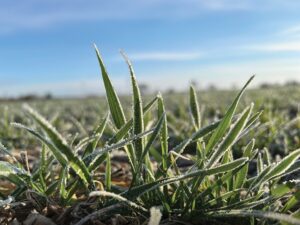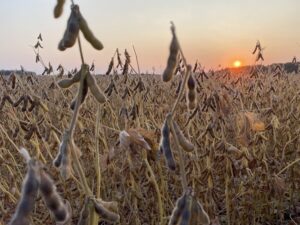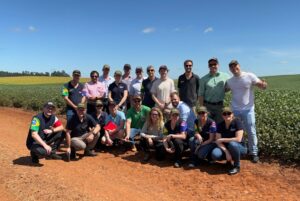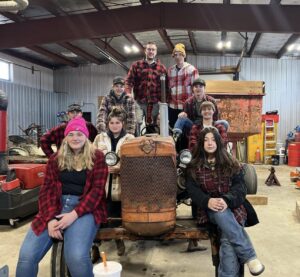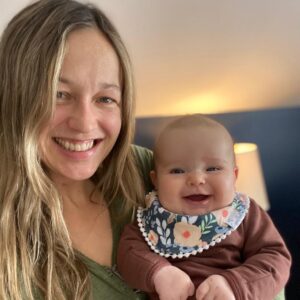The survivors
STRONG SUPPORT HELPS BEAT BACK CANCER
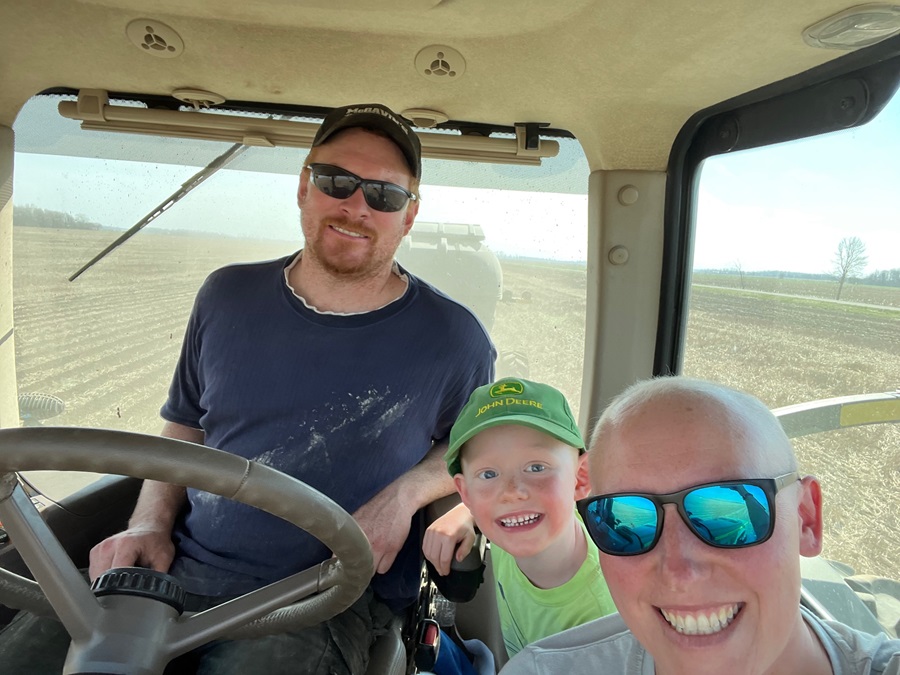
A CANCER DIAGNOSIS CAN BE A DEVASTATING SETBACK FOR YOUNG, BUSY FARMERS, but with personal grit and support from family, friends, and empathetic members of the agricultural community, they can not only survive but thrive.
THE JOURNEY STARTS
“I had my first positive diagnosis in September 2022,” says Sara Wood. It was the nurse, during a routine exam, who first found a suspicious lump in her breast. She then had a series of mammograms, blood tests, and several biopsies before the confirmation.
“Everyone said, oh, it has to be a false positive because you’re so young,” says Wood, who was 33 at the time. She is a fourth-generation Mitchell, Ontario farmer who, along with her husband Chris and mother Deb, raises broiler chickens and grows corn, wheat, soybeans, and cover crops. She’s also mom to Logan, who was four when she was diagnosed. She is now also the vice president of the Ontario Federation of Agriculture (OFA).
While her family doctor informed her of the diagnosis, it was late November before she could find out from the assigned surgeon any details about her disease, which ended up being stage three cancer that had entered her lymph nodes. More tests ensued, including a bone scan and a CT scan. She was frustrated by the silence she received when she asked about why all the tests were being ordered.
The lack of information sharing in the health system was something that Kelsey Banks, who is in remission from brain cancer, also suffered. Part of the problem was the restrictions caused by the Covid-19 pandemic, and part of it was the fact that she had to move from her home in western Ontario to her dad’s home in Kemptville to get to Ottawa for treatments.
“They take your licence away when you’re having seizures, so that’s not great for living in a rural area,” she says.
In 2019, while she was living in an apartment in Drayton, Banks began to experience night-time seizures. She was also tired and was getting frequent headaches, which, at the age of 26, she put down to not getting enough sleep.
Banks share-crops corn, wheat, and soybeans on two properties in southwestern and eastern Ontario. She’s also an agronomist and buyer with Ceresco, a food-grade soybean company based in Quebec. In April, she took an early maternity leave and is expecting her first baby in late June.
She suffered a very serious grand mal seizure at Christmas time in 2019; she was taken to the hospital, where she was misdiagnosed with pneumonia and referred to an ear, nose and throat specialist.
That specialist ordered an MRI, and the way Banks got the results was a bit of a rural saga.
She was at the annual Certified Crop Advisor review in Woodstock, where there wasn’t any cell service. After a circuitous route involving calls from the specialist to her dad to the hotel where she was staying, she finally got in touch with the specialist who had set her up with an oncologist.
“My dad was almost home to Kemptville from attending Christmas events in western Ontario,” she says, and when she called to ask him to take her to St. Michael’s hospital in downtown Toronto the next day, he said ‘for sure,’ right away. She credits her dad as her biggest supporter.
After her diagnosis in late January 2020, Banks had brain surgery on February 19. Then Covid hit.
GETTING TREATED
“I just wanted to get the treatment over with,” Banks says, but after moving everything, including all her radiation and chemotherapy information, to Ottawa, they closed the cancer clinic because of pandemic restrictions.
“They held everything off,” she says, and finally was able to get in on June 1 for 30 rounds of radiation and six rounds of chemotherapy. She was also on steroids, which helped get her through the trials, but had brutal side effects like getting puffy and swollen.
While her journey to and from treatments ‘wasn’t terrible’ at 45 minutes from her dad’s home, Banks says the lack of communication among the doctors was really frustrating. She didn’t even know what type of cancer she had (an astrocytoma versus an oligodendroglioma, which had previously been the diagnosis) until she read the discharge papers from the local hospital after having another seizure.
“The Toronto doctors thought the Ottawa doctors would tell me, and the Ottawa doctors thought the Toronto doctors told me,” she says. She finally went into remission on March 14, 2021.
About a year and a half later, Wood had a different experience.
“Most of the time, they do surgery first, then chemotherapy, but I had the chemo first,” she says, adding that she had eight rounds of therapy with three different drugs combined in a dose every two weeks.
After a couple of rounds of treatment before and after Christmas 2022, her hair was so matted that her girlfriends had to cut it all off.
“They made me laugh through the process and allowed me time to deal with my emotions while showering it all out,” she says.
The very next day, the friends flew out to participate in the Disney marathon. Wood completed a five-kilometre, ten-kilometre, half marathon, and full marathon on four successive days.
“I told my oncologist that I was running this Disney marathon, and I could start chemo before or after, but either way, I was doing it,” she says. “Looking back on it, it gave me something to look forward to.”
Wood is very athletic and enjoys swimming as well. Ironically, the surgeon she spent three months trying to see was swimming three lanes over from her the whole time.
“She described the eight rounds of chemo as a 400-metre individual medley (100 metres each of backstroke, breaststroke, butterfly, and freestyle), reminding me that the hardest part is after 300 metres, or after the sixth round of treatment — that really helped.”
Running and swimming were very important to her throughout her entire journey, and she set a goal of running 600 kilometres during her chemotherapy. She also maintained a normal working schedule in her job with the OFA as much as possible. She finished chemotherapy on March 24, 2023, and had a double mastectomy in April.
“I told them at the time that if you’re taking one side, take the other side — I’m not attached to them because if they’re trying to kill me, I’d rather be here than not be here.” She also started reconstruction surgery at the same time.
LEANING ON SUPPORT
Both women credit the people and organizations around them for helping them get through their journey.
Wood took advice from Jackie Pemberton, who is on the board of the OFA and had breast cancer two years previously.
“She was always available to help with tips and tricks on how to get through things,” she says.
Friends and family drove her the hour-long journey to and from chemotherapy and post- operative radiation treatments and kept her in good spirits.
The OFA board was very accommodating, and the local board actually arranged freezer meals for her after her surgery.
“That support was huge and allowed us to keep doing the things we wanted to do,” she says. Banks leaned heavily on her father and went to therapy because visiting with friends was a no-go due to the pandemic. She tried to walk every day, even if it was just down the road a bit, and she found yoga and meditation a calming influence.
“The ag industry was very supportive, and our sharecroppers insisted on me taking care of myself first – they’re amazing people,” she says, noting that not being able to be independent — especially being unable to drive anywhere and relying on others for everything — was tough.
Both women also say that the experience has been life-changing.
Banks says that while she’s still very career-driven and dedicated to moving the agriculture industry forward, she’s taking time to sort out her priorities more than in the past. Listening to what her body is telling her is essential now, too. She has the same advice to people who have cancer and those caring for them.
“Really listen — to what they’re asking for and take the time to listen to your own needs because you can’t help if you’re not up to it,” she says.
Wood says that going to the gym is now her way of decompressing. She credits the strong support of family, friends and the OFA and staying very active for helping her succeed in beating back the disease. Her next goal is to remain cancer-free for a total of five years.
Her advice to others is “having goals and advocating for yourself because you can really get lost in the health care system.” •



